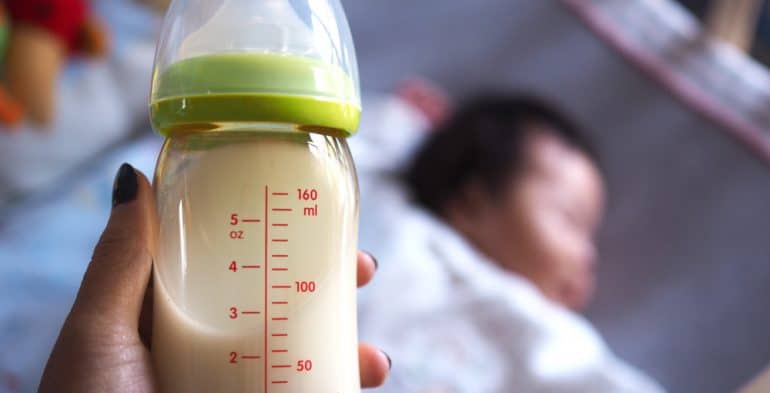
Everyone knows that breast milk is the most healthy food for a baby. But have you ever wondered what’s in it that makes it so good?
Nutrients Found In Breast Milk
The following is a brief overview of the components of breast milk and the nutrients they provide for your baby:
Water
We don’t need to say too much about this. Everyone needs water and especially babies. Breast milk is nearly 90% water!
Proteins
Human milk contains two types of proteins: whey and casein. Approximately 60% is whey, while 40% is casein. This balance of the proteins allows for quick and easy digestion. If artificial milk, also called formula, has a greater percentage of casein, it will be more difficult for the baby to digest. Approximately 60-80% of all protein in human milk is whey protein. These proteins have great infection-protection properties.
Listed below are specific proteins that are found in breast milk and their benefits:
Lactoferrin inhibits the growth of iron-dependent bacteria in the gastrointestinal tract. This inhibits certain organisms, such as coliforms and yeast, that require iron.
Secretory IgA also works to protect the infant from viruses and bacteria, specifically those that the baby, mom, and family are exposed to. It also helps to protect against E. Coli and possibly allergies. Other immunoglobulins, including IgG and IgM, in breast milk also help protect against bacterial and viral infections. Eating fish can help increase the amount of these proteins in your breast milk.
Lysozyme is an enzyme that protects the infant against E. Coli and Salmonella.. It also promotes the growth of healthy intestinal flora and has anti-inflammatory functions.
Bifidus factor supports the growth of lactobacillus. Lactobacillus is a beneficial bacteria that protects the baby against harmful bacteria by creating an acidic environment where it cannot survive.
Fats
Human milk also contains fats that are essential for the health of your baby. It is necessary for brain development, absorption of fat-soluble vitamins, and is a primary calorie source. Long chain fatty acids are needed for brain, retina, and nervous system development. They are deposited in the brain during the last trimester of pregnancy and are also found in breast milk.
Vitamins
The amount and types of vitamins in breast milk is directly related to the mother’s vitamin intake. This is why it is essential that she gets adequate nutrition, including vitamins. Fat-soluble vitamins, including vitamins A, D, E, and K, are all vital to the infant’s health.
Water-soluble vitamins such as vitamin C, riboflavin, niacin, and pantothenic acid are also essential. Because of the need for these vitamins, many healthcare providers and lactation consultants will have nursing mothers continue on prenatal vitamins.
Carbohydrates
Lactose is the primary carbohydrate found in human milk. It accounts for approximately 40% of the total calories provided by breast milk. Lactose helps to decrease a large number of unhealthy bacteria in the stomach, which improves the absorption of calcium, phosphorus, and magnesium. It helps to fight disease and promotes the growth of healthy bacteria in the stomach.
Breast Milk is Best for Your Baby
Breast milk has the perfect combination of proteins, fats, vitamins, and carbohydrates. There is nothing better for the health of your baby. Leukocytes are living cells that are only found in breast milk. They help fight infection. It is the antibodies, living cells, enzymes, and hormones that make breast milk ideal. These cannot be added to formula.
Though some women ultimately are not able to breastfeed, many who think they cannot actually are able to breastfeed. Lactation consultants are able to provide support to women learning to breastfeed. For those who are not able to breastfeed, milk banks or donor milk may be an alternative.








